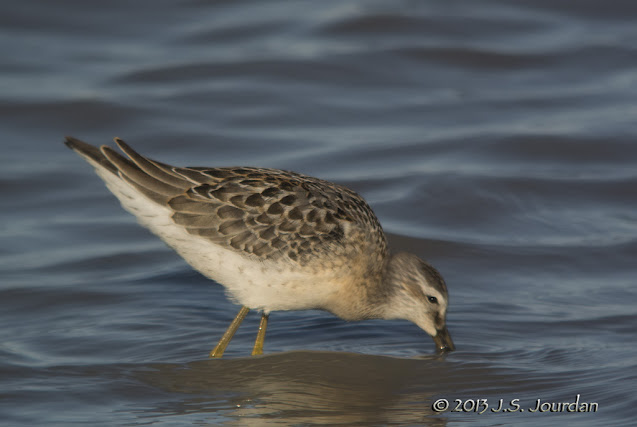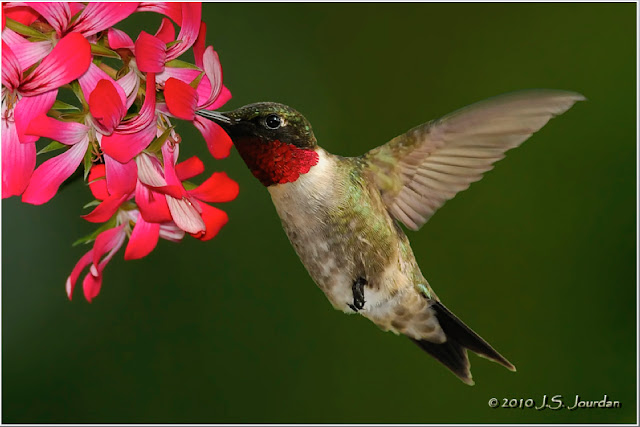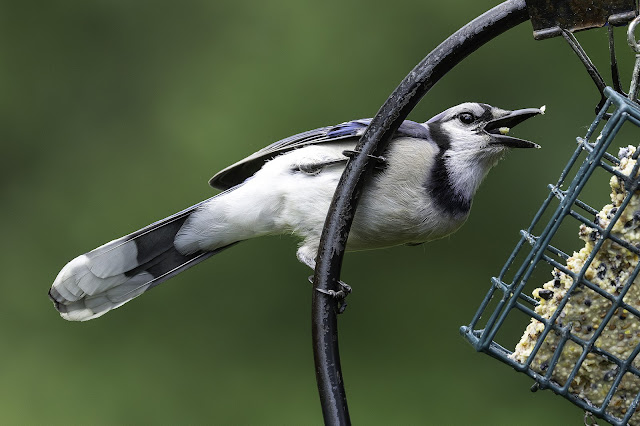Red Knot and Long-billed Dowitcher! - 24 Aug 2013
As I was riding toward the Banana I stopped for an approaching vehicle. Jim Fowler was driving Tex Wells and Dave Washington back to their cars. We chatted a moment, and he told me of the Red Knot showing good looks in Cell 3. So I continued on quickly to Cell 3.
I found Darlene Friedman enjoying the shorebirds from the NW portion of the mudflats. But I also saw Pete and Noreen Kryluk farther toward the south end, so I headed down to say hello to them after exchanging greetings and information with Darlene.
I spent a few minutes chatting with Pete and Noreen and showed them some of the many Semipalmated Sandpipers, Least Sandpipers, Semipalmated Plovers and Lesser Yellowlegs in the area. The American Avocet was out in its usual location and too far to digiscope. But as I was scanning the far mudflat shoreline I spotted a pair of Long-billed Dowitchers foraging. No sooner did I grab the camera that they took off for the south end of the cell. The basic plumage and hunched backs were unmistakeable, though.
Jim soon returned and he and Darlene headed out. I decided to head off toward the south end of Cell 3 to look for the Long-billed Dowitchers, so I said my goodbyes to Pete and Noreen. A number of shorebirds were on the drying mud as I walked, and I was able to make out one Baird's Sandpiper at a distance. An American Golden Plover was out on the mud near the Avocet, and photos of that bird would have to wait.
 |
| Short-billed Dowitcher profile |
Six of the Wilson's Phalaropes were still in the area, and several birds were also less than 20' away from me. They provided some wonderful portraits.
Not to be outdone the Stilt Sandpipers were also posing for portraits.
With the sun dropping below the tree line I headed back toward the bike.
A Baltimore Oriole was foraging near the shoreline but would not hold still for photos. I did stop long enough to grab a couple pics of the Ruddy Turnstone in the last light of the evening. I would then spot a possible 3rd Long-billed Dowitcher out on the mudflats more toward the north end of the mudline. A funny looking Dunlin was also present, showing mid-molt and spotted flanks and belly. The Red Knot could not be relocated so I headed back to the car.
Pte. Mouillee SGA (permit required Sep 1-Dec 15), Monroe, Michigan, US
Aug 24, 2013 5:00 PM - 7:30 PM
Protocol: Traveling
4.35 mile(s)
Checklist Comments: Andrew Sturgess reported a Red Knot this morning so I was pumped to get back out to Cell 3 at Pt. Mouillee.
14 species
American Avocet (Recurvirostra americana) 1 Continuing tall shorebird w/ orange head and recurved bill.
Black-bellied Plover (Pluvialis squatarola) 1
American Golden-Plover (Pluvialis dominica) 1
Semipalmated Plover (Charadrius semipalmatus) 2
Short-billed Dowitcher (Limnodromus griseus) 12
Long-billed Dowitcher (Limnodromus scolopaceus) 3 Pair, basic plumage in Cell 3. Plump dowitchers with plain tertials and inflated appearance. Pics. 3rd one found towared north end of Cell 3.
Wilson's Phalarope (Phalaropus tricolor) 6 from blog post: Six of the Wilson's Phalaropes were still in the area, and several birds were also less than 20' away from me. They provided some wonderful portraits.
Lesser Yellowlegs (Tringa flavipes) 12
Ruddy Turnstone (Arenaria interpres) 1
Red Knot (Calidris canutus) 1 Stocky mid-sized shorebird w/ gray feathers and white fringes that show distinct "fish-scale: appearance. White eyebirow and stocky mid-length straight bill.
Stilt Sandpiper (Calidris himantopus) 12
Dunlin (Calidris alpina) 1
Baird's Sandpiper (Calidris bairdii) 1
Snowy Egret (Egretta thula) 6 from blog post: As I reached the Humphries Unit I spotted one of six Snowy Egrets close to shore. The five other birds were farther back in the sedges, but this one was close enough to approach and digiscope. The sun was side-lighting it quite a bit, so I had to wait until it turned just right in order to capture its yellow lores, black bill, black legs and yellow feet. The amount of yellowing on the legs suggest a juvenile bird, as a nonbreeding adult would show yellow extending along the back of the legs only.
View this checklist online at https://ebird.org/checklist/S1
This report was generated automatically by eBird v3 (https://ebird.org/home)
Aug 24, 2013 5:00 PM - 7:30 PM
Protocol: Traveling
4.35 mile(s)
Checklist Comments: Andrew Sturgess reported a Red Knot this morning so I was pumped to get back out to Cell 3 at Pt. Mouillee.
14 species
American Avocet (Recurvirostra americana) 1 Continuing tall shorebird w/ orange head and recurved bill.
Black-bellied Plover (Pluvialis squatarola) 1
American Golden-Plover (Pluvialis dominica) 1
Semipalmated Plover (Charadrius semipalmatus) 2
Short-billed Dowitcher (Limnodromus griseus) 12
Long-billed Dowitcher (Limnodromus scolopaceus) 3 Pair, basic plumage in Cell 3. Plump dowitchers with plain tertials and inflated appearance. Pics. 3rd one found towared north end of Cell 3.
Wilson's Phalarope (Phalaropus tricolor) 6 from blog post: Six of the Wilson's Phalaropes were still in the area, and several birds were also less than 20' away from me. They provided some wonderful portraits.
Lesser Yellowlegs (Tringa flavipes) 12
Ruddy Turnstone (Arenaria interpres) 1
Red Knot (Calidris canutus) 1 Stocky mid-sized shorebird w/ gray feathers and white fringes that show distinct "fish-scale: appearance. White eyebirow and stocky mid-length straight bill.
Stilt Sandpiper (Calidris himantopus) 12
Dunlin (Calidris alpina) 1
Baird's Sandpiper (Calidris bairdii) 1
Snowy Egret (Egretta thula) 6 from blog post: As I reached the Humphries Unit I spotted one of six Snowy Egrets close to shore. The five other birds were farther back in the sedges, but this one was close enough to approach and digiscope. The sun was side-lighting it quite a bit, so I had to wait until it turned just right in order to capture its yellow lores, black bill, black legs and yellow feet. The amount of yellowing on the legs suggest a juvenile bird, as a nonbreeding adult would show yellow extending along the back of the legs only.
View this checklist online at https://ebird.org/checklist/S1
This report was generated automatically by eBird v3 (https://ebird.org/home)




































Comments
Post a Comment
Please leave a comment. I will try to respond ASAP.